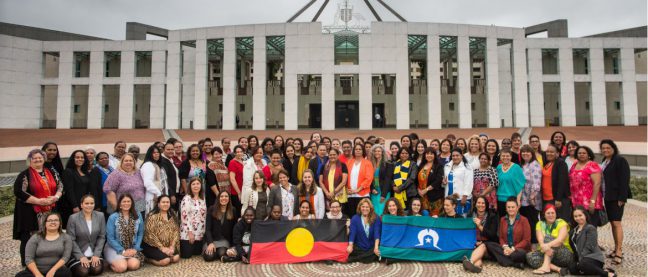By Shelley Cable, 2016 Straight Talk participant
Let me begin by confessing: last week, I had no interest in politics. Zilch. I was honestly more interested in what I would eat for lunch. To me, Parliament House was a place I couldn’t relate to, where people I didn’t know made decisions for everybody else.
I was willing to let our politicians do their job, if it meant I didn’t need to know about the different political parties and their policies (a quick Google search before an election was sufficient for me). Looking back now, if I consider that Australia’s black history was fully shaped by policy, decided by those people I didn’t know, in that place I couldn’t relate to… My view was quite a naïve one to have.
That was until Straight Talk at least, which involved flying 80 Indigenous women to Ngunnawal Country (Canberra), from literally every nook and cranny of Australia. Run by Oxfam Australia and facilitated by Michelle Deshong, the program aimed to educate us all about Australia’s political history and system.
We learned that when “women” earned the right to vote in 1908, Indigenous women somehow didn’t count. We were also taught that non-Indigenous people were completely excluded from the political system until the 1967 Referendum. And yet, we realised that the first Indigenous man was elected into Federal parliament a mere four years later (Neville Bonner, in 1971), and that today we have the highest Indigenous representation in Parliament, in history – and more than 50% of them are female.
While we learned of a system that had historically and systemically disempowered us, we reached an odd conclusion: we were leaving Straight Talk feeling more empowered than ever before. ‘Parliament’ was no longer a black box, and words like “front bench”, “Minister” and “electorate” no longer scared us. We knew what they meant, we knew how they worked, and finally we knew how to pull the levers.
Another surprising result came from Question Time .. I was filled with immense pride. This had nothing to do with the (mostly white, male) politicians squabbling away, but instead, the two Indigenous MPs — Ken Wyatt and Linda Burney — sitting quietly in the chamber. While their presence was may have been overlooked by everyone else in the public gallery, these two MPs were the first people we Straight Talkers saw. There’s something to be said about role models – seeing people in Parliament that look like you is exceptionally powerful.
Photo: Jillian Mundy / Oxfam
It made my heart sing, to know that both Indigenous and non-Indigenous people had voted Ken and Linda as the best ambassadors for their community.
And in that moment, it all clicked for me. All of a sudden, politics seemed like a natural progression from being an ambassador for a community.
It also became the way Indigenous people could make the decisions to empower their people, rather than having to rally against decisions made by government about Indigenous people or remote communities.
In fact, “the government” no longer exists in my mind. Instead, it is a system of people doing their best to represent their community’s wishes, and it’s up to us to help them do that better. All of a sudden, politics is empowering.
Finally, it should be noted that while the political system excluded Indigenous Australians until 1967, politics are not new to Indigenous people. In fact, a commonly held belief is that if you encounter “black politics” and survive, mainstream politics will be easy! And further, as an Indigenous person (especially a woman), everything we do — the act of finishing school, holding a job, or just surviving — is a political act in itself.
We need to realise that we have have the experience and ability to step up to make change on a national scale.
Straight Talk is exactly what empowerment looks like – thank you Oxfam for working with us. Keep an eye out for the 600+ Straight Talk Alumni who are continuing to make waves across the country, including the Torres Strait’s first female Indigenous mayor Vonda Malone.

